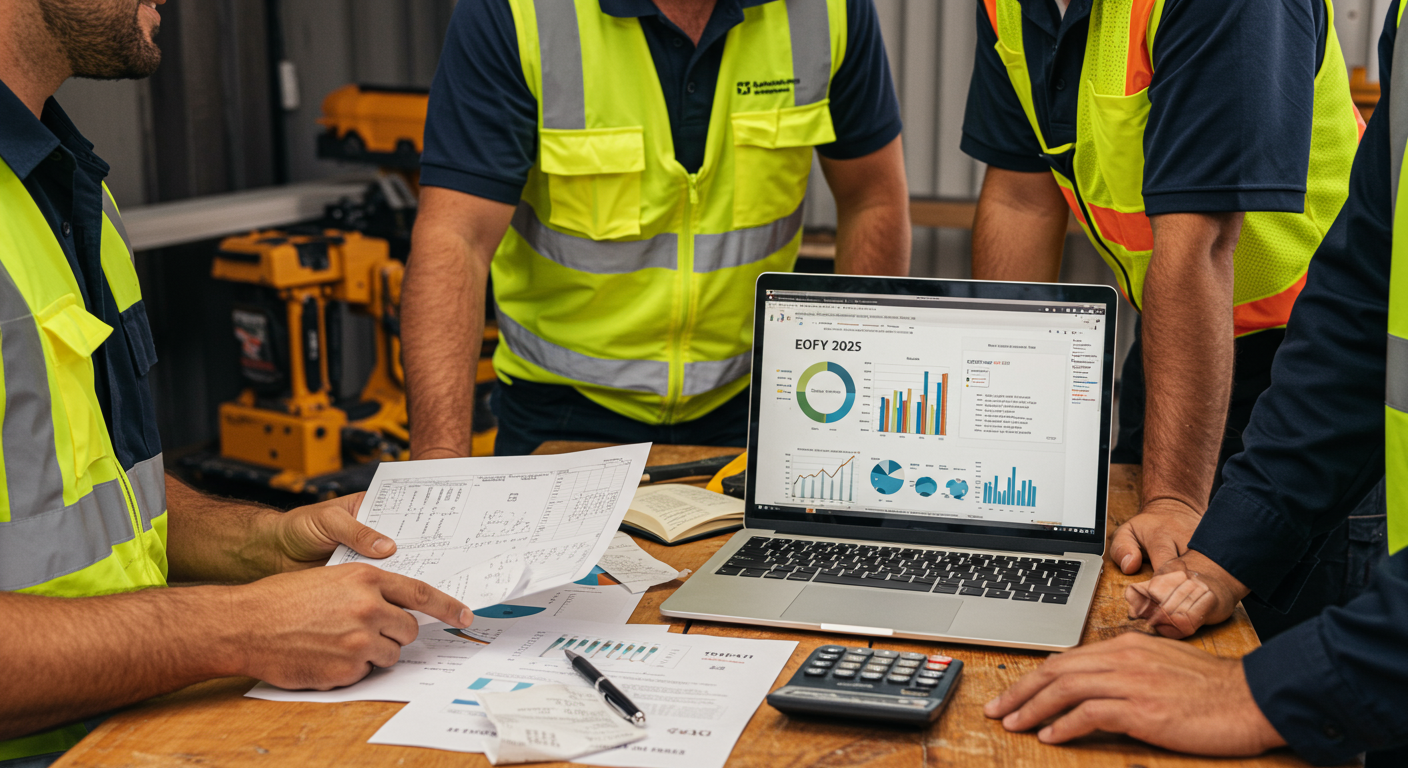Are you an Aussie tradie worried about the upcoming end of the financial year? Many find themselves rushing to organise receipts and reduce their tax burden during EOFY. What if we let you know there’s a different option? Couldn’t the Australian financial year help your business move forward instead of being just something you have to deal with at tax time?
This guide is written to help before the last day of the fiscal year. We help tradies go from number-crunching to planning their finances more actively. Ensure that each financial year brings success to your trade business.
What is EOFY in Australia?
EOFY means End of Financial Year in Australia. This is about the end of Australia’s financial reporting period which always happens on June 30th. On July 1st, the new financial year starts.
EOFY is an important moment for both individuals and businesses, because that is when:
- Financial records are finalized: Businesses and individuals “wrap up their books,” their account records and make a list of their income and expenses for the last 12 months. and ensure all financial activities are accounted for.
- Tax returns are prepared and lodged: This is the primary reason EOFY is so important. Information from this time is processed by the Australian Taxation Office (ATO) to decide taxes to be paid or refunded.
- Tax deductions are claimed: Both individuals and businesses seek expenses that qualify them for tax deductions.
- Compliance obligations are met: This includes Business Activity Statements -BAS are filed for GST-registered businesses on time, Single Touch Payroll reporting is finalised and all superannuation contributions are up-to-date.
- Financial performance is assessed: The year’s finances are looked at and you can spot strengths and weaknesses, as well as decide on financial objectives for the year that lies ahead.
The financial year ends on June 30th, yet “tax season” is from July 1st to October 31st for most individuals and some businesses, unless they use a registered tax agent, which may offer extended deadlines.
The Australian Financial Year: A Strategic Opportunity, Not Just a Deadline
Consider the financial year to be both your business’s annual report for what happened last year and your guide for the year to come. It is the ideal time to:
- Review Your Business Performance: Look back and see how your business performed over the last year. What times of the year kept you most rushed? Of all jobs available, which ones provided the best returns? Did you face any expenses you weren’t expecting?
- Identify Areas for Growth or Cost Reduction: Analyse Areas That Might Need Improvement or Spending Reduction: See if certain operations are surging or if there’s no point using a tool when it’s so costly to upkeep. Going through the review allows you to make your operations more efficient.
- Set Financial Goals for the Next FY: Plan for Improved Sales in the Next Financial Year: Is your plan to see sales go up by 15%? Should we purchase new equipment? Would bringing on an apprentice be a good idea? Determined financial aims guide your business on what to work towards this year.
Year-Round Record-Keeping Habits for Tradies
A stress-free EOFY and maximised benefits for tradies depends on staying organised when you record your expenses.
- Embrace Digital Tools and Apps: We don’t have to stack up receipts in a box anymore.
- ATO app: Better to use the ATO app to help you track your deductions, submit reports and keep up with tax matters.
- Xero, MYOB, Reckon: Those working in the trades industry can benefit from Xero, MYOB and Reckon, since they specifically include features like invoicing, quoting, payroll and tracking expenses. Because many connect to your accounts, it is easy to stay on top of reconciliation. Make sure the application can help you quickly assign expenses to certain jobs.
- Organizing Receipts and Invoices: Whether you take pictures with your phone or use a scanner to capture expenses, keep all your business expenses documented in some way. Sort the items right away.
- Separate Business and Personal Expenses from Day One: Keep your business money aside from your personal money right away. Keep all your business money in a separate bank account and use a special credit card just for your business. It ensures you’ll have fewer bookkeeping issues and will find it much simpler to claim tax deductions as a tradie.
Proactive Tax Planning Tips: Stay Ahead of the ATO
Don’t wait until June to think about tax! Smart financial year in Australia planning involves:
- Regular BAS Reviews: If you’re GST registered, lodging your Business Activity Statements (BAS) regularly helps you stay on top of your GST obligations and often triggers a refund if you’ve paid more GST on your purchases than you’ve collected.
- Estimating Income and Tax Liability Throughout the Year: This helps avoid nasty surprises. Your bookkeeper or accountant can help you project your income and estimate your potential tax bill, allowing you to set aside funds.
- Understanding PAYG Instalments: If you’re a sole trader or partnership and your business income reaches a certain threshold, the ATO might require you to pay Pay As You Go (PAYG) installments. These are prepayments of your income tax for the current financial year. Understanding them prevents cash flow shocks.
- Considering Salary Sacrifice for Employees (if applicable): If you employ staff, salary sacrificing into superannuation can be a tax-effective strategy for them, and good for employee retention.
Investing in Your Trade Business: Smart Growth Strategies
Your business is your biggest asset. Investing wisely can lead to significant long-term gains.
- Strategic Asset Purchases vs. Instant Write-Offs: While instant asset write-offs (e.g., for tools, vehicles, or equipment) are fantastic for reducing your taxable income in the year of purchase, always buy what your business truly needs. Don’t buy for the sake of a deduction. Discuss with your accountant how current depreciation rules apply for the 2025 financial year.
- Training and Upskilling as an Investment: The best tool in your kit is your knowledge. Investing in new certifications, safety training, or specialized skills not only makes you more competitive but can also be a legitimate business expense.
- Marketing and Advertising for Long-Term Growth: A strong online presence, local advertising, and good old word-of-mouth are crucial. Budget for marketing to ensure a steady stream of future work.
Protecting Your Business and Income: Essential Insurances for Tradies
Even the best financial planning can’t predict every twist and turn. Robust insurance is your safety net.
- Public Liability Insurance: Essential for any tradie. Protects you against claims of personal injury or property damage to a third party as a result of your business activities.
- Professional Indemnity Insurance: If you offer advice or design work (e.g., in plumbing, electrical, or building consultancy), this covers you against claims of negligence or errors in your professional services.
- Income Protection Insurance: What happens if you can’t work due to illness or injury? Income protection provides a regular income stream, allowing you to focus on recovery without financial stress.
- Tool Insurance: Your tools are your livelihood. This covers them against theft, loss, or damage.
- Succession Planning (brief mention for established businesses): If you have an established business, consider how you would transition ownership or leadership in the future.
Superannuation for Tradies: Building Your Future Security
While you’re busy building homes, fixing pipes, or wiring up buildings, don’t forget to build your own nest egg! Superannuation is a critical part of your long-term financial health.
- Employer Obligations: If you employ staff, you have a legal obligation to pay super guarantee contributions for eligible employees. Make sure you’re meeting these obligations on time and correctly.
- For Sole Traders: As a sole trader, you don’t have compulsory super contributions, but contributing to your own super is one of the smartest smart money moves you can make.
- Tax Deductible Contributions: Personal contributions to your super fund can often be tax-deductible, reducing your taxable income for the year. This is a significant benefit for tradies tax planning.
- Compound Interest: The earlier you start, the more time your money has to grow thanks to the power of compound interest.
- Choosing a Fund: Research different super funds to find one that suits your needs, with competitive fees and good performance.
Working with Financial Professionals: Your A-Team
You’re an expert tradie; let financial professionals be your expert guides.
- When to Hire a Bookkeeper vs. an Accountant:
- Bookkeepers handle the day-to-day data entry, payroll, BAS preparation, and general ledger maintenance. They keep your records tidy.
- Accountants offer strategic advice, prepare your annual tax return, analyze your financial performance, help with tax planning, and advise on business structures and growth. Many tradies benefit from having both!
- The Benefits of Ongoing Financial Advice: Don’t just see your accountant once a year for tax time. Regular check-ins can help you make informed decisions throughout the year, optimize your tax position, and achieve your financial goals faster.
Start Today, Not June 30th!
Don’t let EOFY Australia catch you off guard in 2025 or any year after. By implementing these smart money moves – proactive record-keeping, consistent tax planning, wise investments, and protecting your assets – you can transform the financial year from a source of stress into a really powerful engine for your trade business’s success.




